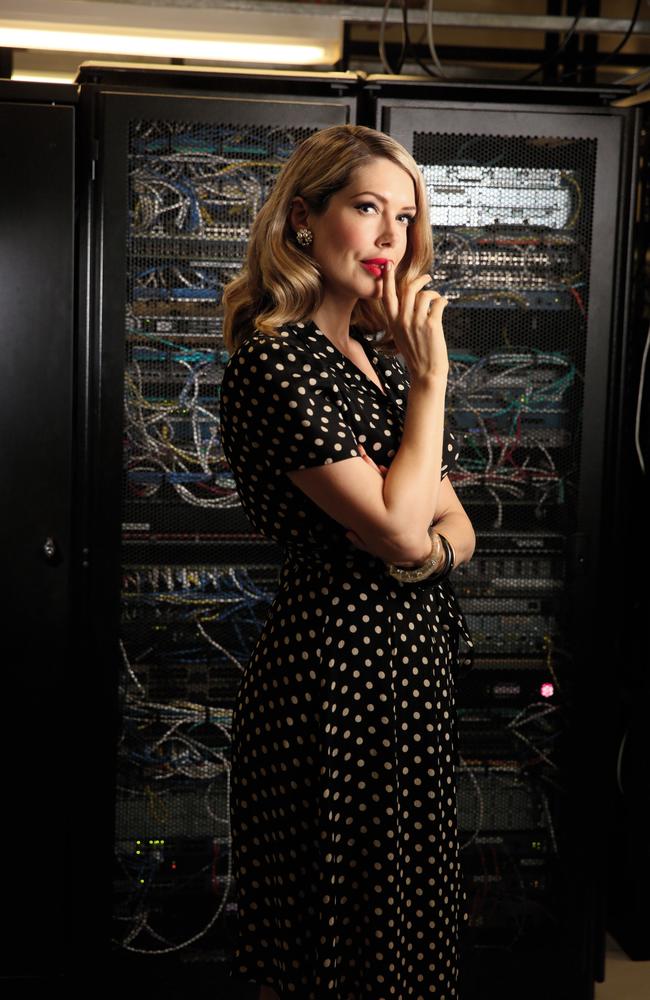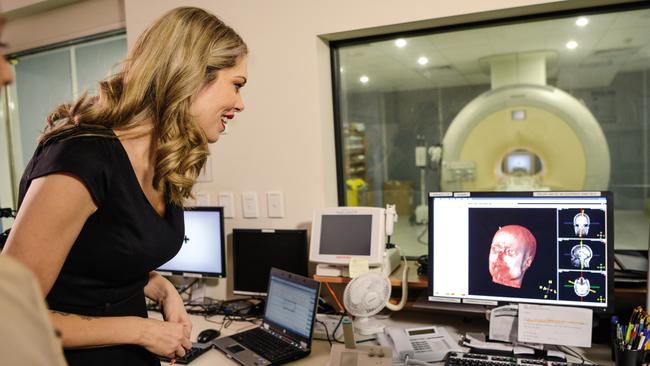‘Cyber-bullying is just as hideous as physical abuse’
SHE first made her name as a model-turned-author. Now, Tara Moss has her sights set on fighting cyberhate and combating online misogyny.

Stellar
Don't miss out on the headlines from Stellar. Followed categories will be added to My News.
TARA Moss is having her brain scanned. She’s trapped inside an MRI machine, being assaulted by the strange claustrophobic clicks and thumps that accompany the procedure. But that’s not all that’s happening.
The words, “Have you no shame, whore?” appear on a screen in front of her. “Lying about being raped to sell your garbage book?” it continues. “I hope you do get raped for your lies.”
This, clearly, is no ordinary MRI. The 43-year-old former model and best-selling author is taking part in an experiment to record her responses to online threats, as part of her new TV show Cyberhate With Tara Moss. Each of these ugly insults are real messages she’s received online in the past. The scan shows that her body is being racked with very real and very concerning physiological responses to the words penetrating her consciousness. “My automatic nervous system kicked in, my heart rate went through the roof and stress hormones flooded my body,” Moss says later. “The adrenaline response was very strong.”

Moss’s reaction is unsurprising, says Dr Sylvia Gustin, a senior neuroscientist and psychologist at the University of New South Wales. She was the one making the insults appear onscreen during the MRI. “When Tara was in the MRI machine and exposed to these violent words, it was difficult for her not to focus on them. This is what actually makes us sick,” Gustin tells Stellar. “We know that emotional abuse, such as cyber-bullying, is just as hideous as physical abuse. [It] can have devastating effects, causing problems such as sleep trouble, anxiety, depression and even suicide.”
Moss, who started modelling when she was 14 before going on to become a best-selling crime author and human rights activist, is the first to admit that she doesn’t receive nearly as much abuse as some of her contemporaries, particularly women. That’s right, those casual rape threats above are “mild” in the scheme of things.
“The women journalists who I’ve spoken to have had their children threatened. They also get sexualised threats of rape. It’s pretty unpleasant, and it impacts women’s lives in very concrete ways,” Moss says.
Words can cause harm in a similar way that me punching you in the face would cause you harm
Dr Emma Jane, who researches online misogyny and cyber-bullying, says online abuse is a very real form of violence. “Words can cause harm in a similar way that me punching you in the face would cause you harm,” she explains.
Gustin adds that emotional abuse isn’t simply as bad as physical abuse — it can be even worse. “That’s because the victims of emotional abuse blame themselves and minimise their abuse. They say, ‘It was only online words, at least he/she didn’t hit me.’ The more you deny and suppress feelings of sadness, helplessness and fear, the stronger these feelings are in your mind and the more they have an impact on both your physical and mental health,” she says.
Moss admits that she has become less affected by the abuse over time. “I’ve become a little more used to it, as sad as that might be,” she says. But a line is crossed for Moss, mother to a six-year-old daughter, Sapphira, when someone she loves is threatened. “You can’t shut that off,” she tells Stellar.
Andree Wright, the government’s former acting Children’s eSafety Commissioner, says we ought to send the old adage “words can never hurt me” back to the pre-internet age where it belongs. “The impact of online abuse can be very much the same as what’s said face-to-face. It can actually feel more invasive because there’s a sense that it follows you,” she explains.
And it’s incredibly common. “More than three-quarters of all Australians under the age of 30 experience online abuse. That’s a staggering number of people,” Moss says. “We are well overdue to take this issue seriously and examine it properly.”
If we don’t, Moss argues, the trolls win. “When the bullies get to have their voices heard and say what they want, even if it’s against the law, it’s not good for democracy and it’s not good for day-to-day life — for any of us.”

Tackling the ingrained misogyny and culture of hate on the internet is a complex task. The answer is not as simple as deleting Twitter or turning off your phone and ignoring it, as many sceptics suggest. Telling a victim to step away from a place where he or she wants to be — e.g. the internet — sounds a lot like victim-blaming. So it’s up to larger forces to start making waves.
“We need to make changes to legislation,” Jane says. “Police need to be trained and take complaints seriously. Schools need resources in cyber civility. Parents need to talk about engaging online with their kids, and individuals need to take responsibility for the way we use technology and call out bad behaviour.”
For victims, Gustin says the first step in dealing with online abuse is talking about it. “It needs to be processed and not suppressed. Only then can you heal.”
Moss suggests victims go one step further. “You have the right to report abuse. That is true in the physical world, as well as the online world.”
Both Twitter and Facebook have policies around cyberabuse, but will only act to ban users if they know about it. The police also have the right to confront cyber-bullying. Last year 25-year-old Zane Alchin from Sydney was given a 12-month good behaviour bond for bombarding women with obscene messages online. It’s not jail, but it is a conviction.
Wright hopes the series will make Australians stop and think about the way they behave online. “I wish for the cool kids in school, both online and offline, to be kind. Let’s make it cool to be good online.”
Cyberhate With Tara Moss airs 9.30pm Wednesday, on ABC2.
LIFELINE: 13 11 14.
Originally published as ‘Cyber-bullying is just as hideous as physical abuse’


